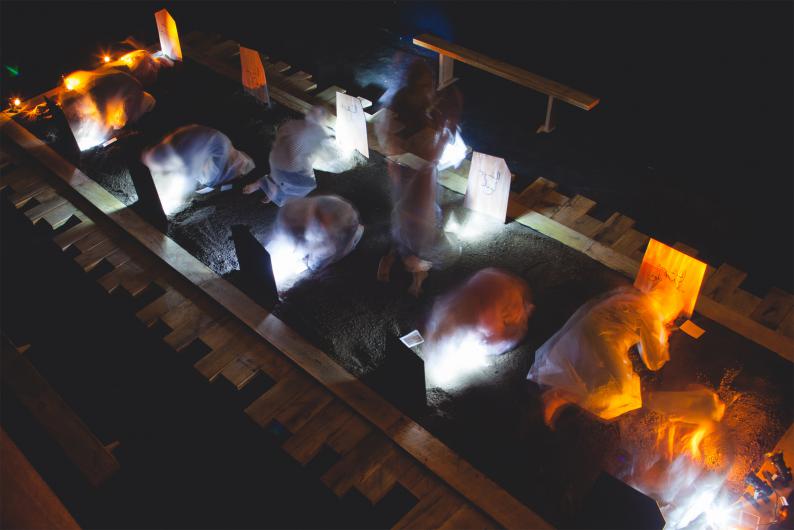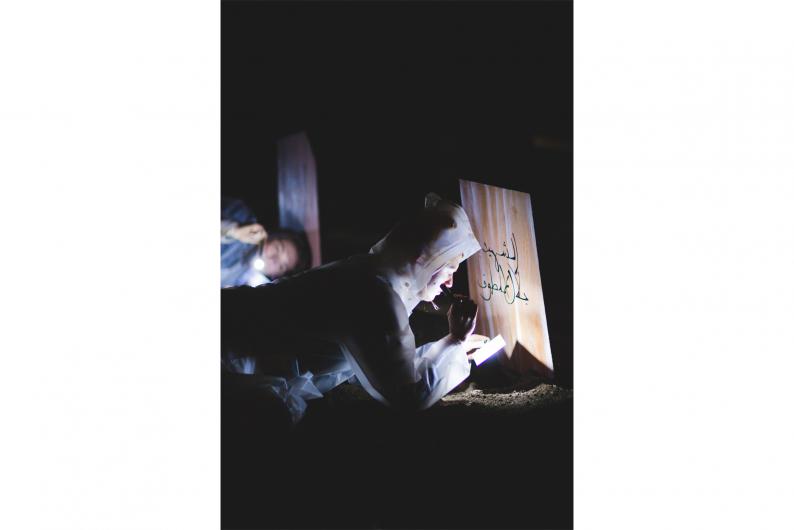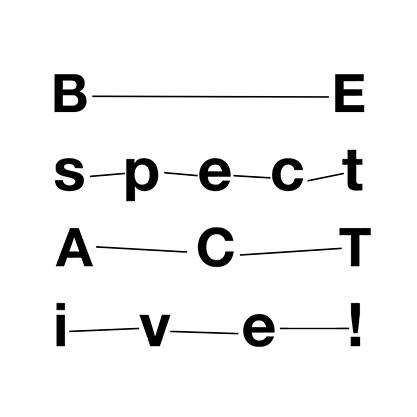Tania El Khoury – Gardens Speak
Dear Tania!
I am sitting by my kitchen table, observing the nearly naked trees outside my window and going through the notes I ferociously took after taking part in your performative sound installation. I had to scribble them down almost immediately, I had so many thoughts and emotions. And although I washed my hands twice, I could still feel the soil under my fingernails.
I keep thinking about how rich of a symbol the garden is, lavish, abundant, lush. You think of fruits and chirping of birds. The cemeteries I know, are full of trees, bushes, flowers, bees, cats, and squirrels, much like gardens. Some things come to an end and others flourish. Your garden was bare and fallow, yet vibrating with life that cannot be ceased or tamed. Sizzling with stories. There were no plants, just imagined bodies enriching the soil of family backyards. I was piercing that soil, deeper and deeper, clutching my fists on cold, moist dirt, trying to get closer and closer to the story.
The setting was so intimate, it pulled me right in and impacted all of my senses. I felt like I was slowly descending into the mythological valley of death. I first kneeled with my ear to the ground. Then I lied on my side, inhaling the scent. I had soil in my eyes, I didn't care. I remember that at the end, something was scattered upon us. I thought it was more dirt and that I was now burried in the garden too and will stay in this underworld forever. But it turned out to be white flowers, possibly dried. Dead and alive in one embrace like in a myth.
My first thoughts after the performance were: I could so relate to the thoughts and emotions of a teenage rebellious girl, aching for freedom and dreaming about the revolution. But then I felt ashamed that I dared to even make this connection. I am alive and I have never experienced the war.
Although I appreciated the time to seat down, contemplate and write a letter, I was lost for words. I felt guilty and powerless: what could I have done? What can you really do knowing there's such a horror happening every day? And then I realized, it is not and should not be about me, my opinions, guilt, and shame. And your piece never asked me to do something other than listen and pay respect. That was my task. I had to put in some work, get dirty and engage to complete it. To listen actively and with compassion. It is emotional labor that we often reject because we can.
I wanted to thank you for creating such a respectful ritual and inviting the audience in.
Zosia Hołubowska
Zosia Hołubowska (born in 1988 in Poland) is a queer sound artist, musician and a music curator, working and living in Vienna since 2016. They explore archives of folk Eastern European music, as well as traditions of magic, herbalism and demonology, and experiment with archaic ways of singing and synthesizers to create queer soundscapes, installations, performances and audio essays.
https://vimeo.com/showcase/6516050
https://soundcloud.com/zosia-ho-ubowska
Events
Tania El Khoury
Gardens Speak
brut all over Vienna
brut nordwest
barrierefrei
Nordwestbahnstraße 8-10, 1200 Wien
U-Bahn: U1, U2 (Praterstern), U4 (Friedensbrücke), U6 (Dresdnerstraße) Tram: 5 (Nordwestbahnstraße) Bus: 5A (Wasnergasse)
barrierefrei
studio brut
nicht barrierefrei
Zieglergasse 25, 1070 Wien
U-Bahn: U3 (Zieglergasse), Tram: 49 (Westbahnstraße / Zieglergasse)
nicht barrierefrei
Bears in the Park Art Place
nicht barrierefrei
Eyzinggasse 12, 1110 Wien
U-Bahn: U3 (Gasometer) Bus: 72A (Gasometer), 76A, 76B (Simoningplatz)
nicht barrierefrei
WUK performing arts
barrierefrei
Währinger Straße 59, 1090 Wien
U-Bahn: U6 (Währinger Straße / Volksoper), Tram: 40, 41, 42 (Währinger Straße / Volksoper), 5, 33 (Spitalgasse), 37, 38, 40, 41, 42 (Spitalgasse / Währinger Straße)
Der Betrieb
barrierefrei
Vogelweidplatz 13, 1150 Wien
U-Bahn: U6 (Burggasse-Stadthalle) / Bus: 48A (Moeringgasse) / Tram: 9 (Camillo Sitte Gasse)











